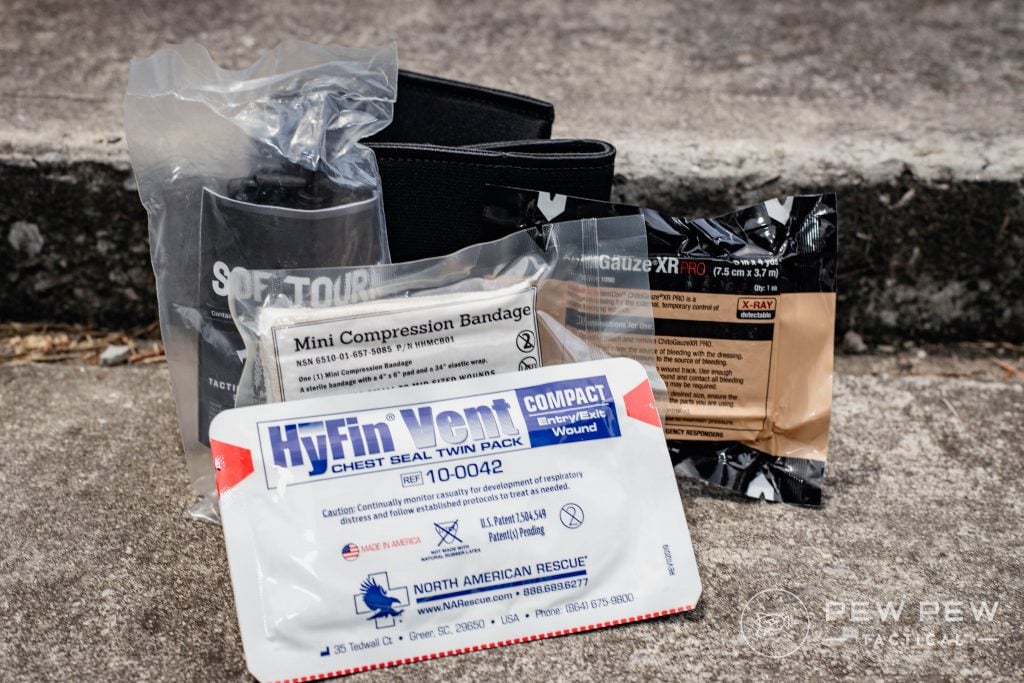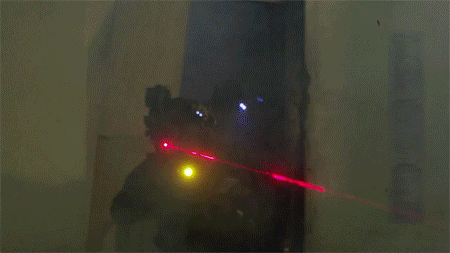Sighting in a new gun — or re-zeroing an older rifle — can be a very frustrating chore…
It can be such a hassle in fact, that we sometimes end up neglecting that first day at the range for fear of pulling our hair out as we chase shots all over the paper — if we even hit paper from the start.
Traditional bore sighting involves some guesswork.
But now, instead of engaging in a procedure equivalent to tossing darts at a dartboard while looking through a rolled-up newspaper, a laser bore sighting system can simplify the whole process for you.

We tested five laser bore sight products — three for general firearm applications, and two specifically for a firearm chambered in .223.
Let’s see how these products performed in the field.
By the end, you’ll have a better idea which ones performed best, under what circumstances, and the ones that might work for you.
Table of Contents
THE QUICK LIST
Testing Procedures
While we performed multiple tests on each product to determine visibility and functionality, we settled on a simple test for comparison’s sake.
The goal was to zero a Savage Axis .270 to 100 yards with as few shots as possible.
We started at 25 yards, aligning our first shot using the bore sighters. From there, we would realign and shoot as necessary until we were zeroed at 100 yards.
However, we did something slightly different for the .223 bore sighting products. We wanted to see how the bore sighters would work to set the iron sights at 25 yards.
Safety Note
Remove your bore sight, either in the chamber or on the muzzle of your weapon, BEFORE test firing the firearm. Failing to do so will cause massive damage to your firearm and/or you and/or the people around you.
You would think this didn’t need to be said, but coffee is hot also. Stay safe out there, people!
And just in case, don’t forget to bring your IFAK to the range with you.

Best General Firearm Bore Sights
These bore sighting tools are not chamber or caliber specific and you can use them on a range of guns though limitations do apply.
1. Bushnell 740100C Laser Boresighter
This is a competent unit, but it lacks power for greater distances and has to be used in a specific way for maximum effectiveness.
The Bushnell can be set up to sight in anything from handguns and rifles to shotguns, and the kit includes arbors to fit from a .22 to a .50 caliber weapon, as well as 12- and 20-gauge shotguns.
Note, however, that this boresight will only work in pistols with barrels 4.5 inches or longer due to its length. Overall, though, the build quality is high, and the all-metal construction feels exceptionally sturdy.
However, the laser did diffuse somewhat quickly, and a special reflective surface was necessary to take full advantage of the Bushnell as we put it through its paces.
We began our testing in the early morning, with less direct sunlight, and we found this boresighter offered laser visibility to just over 50 yards on a white target. Beyond that range, it was a challenge to see the red spot on the white paper.
This is OK, though, as we began testing at 25 yards, and the Bushnell got us on paper easily.
After fitting the arbor, which took a little adjusting to get the screw seated and the fit correct, the boresighter sat snuggly in the .270’s barrel, and we could easily line up our crosshairs.

The first shot was around 4 minutes of angle off high-left at 25 yards, so we simply readjusted for a second shot at 25 yards without the boresight, and moved out to the 50-yard target distance, where we reinserted the boresighter.
This shot was off by about 5 MOA, but we were on paper, and after a readjustment and two more shots, we zeroed the .270 at 100 yards without using the boresight.
Now, it’s important to remember, the pointer isn’t 100% accurate. It won’t point exactly where your shot goes, but it doesn’t have to do that to get the job done. The idea is to save time and ammo by not having to guess while boresighting.
So, after only two shots lined up with the boresighter, we were set up, and the Bushnell was back in the bag.
Not bad, and the unit is capable overall, as long as you know how to use it. The unit doesn’t feature a super-powerful laser, and while it was visible earlier in the day, that visibility dropped significantly over the course of our testing.

It did come with a handy carrying pouch, though, and the system’s versatility is nice.
I can absolutely recommend this product as striking a great balance between price, portability, ease-of-use, wide applicability, and usability.
But be aware, you absolutely need a special reflective surface, preferably designed for use with laser boresights, for the Bushnell to be most effective in a variety of conditions.
2. LaserLyte MBS-1 Mini Laser Boresight
This more compact boresighter performed similarly to the Bushnell product, except that it is smaller and can fit into pistols with barrels from 3 inches and above.
It lacks arbors that will fit shotgun barrels and is intended for use with rifles and pistols exclusively.
Where the LaserLyte shines — pun intended — is in a slightly more powerful, tighter laser. We could spot the laser more easily past 50 yards, and its beam appeared to be tighter in our testing.
That said, the effective range is close to 65 yards, and certainly no more than 70 yards without a special reflective surface to sight off of.
As an aside, a reflective target insert would be a huge help.
When you’re first setting up the LaserLyte — and the Bushnell, for that matter — be aware, the arbors use very small screws that take some finagling to set up properly.
Work over a box or other surface where you won’t have to be concerned about dropping your screws and losing them.
![5 Best Laser Bore Sights [Hands-On Tested]](https://www.pewpewtactical.com/wp-content/uploads/2022/01/Dropped-Screw.gif)
We set the scope on the .270 out of zero and sighted using the LaserLyte. After a single shot at 25 yards, we were only off the expected point of impact by about 2 MOA.
This felt a little tighter than the Bushnell Boresighter, but we were still on paper with both systems.
After we shot again at 25 yards and readjusted the scope, we went out to 50 yards and sighted using the boresight to check the expected point of impact. The next shot was only about 3 MOA off our aim point, and we were easily able to zero from there.
We went out to 100 yards and zeroed easily without using the LaserLyte.
The unit’s greater compactness and slightly more visible laser — especially in more direct sunlight — make the LaserLyte easy to recommend.
The applications between the Bushnell and the LaserLyte are slightly different, and if you’re seeking a boresighter with greater versatility when it comes to pistols, this is probably the unit for you.
![5 Best Laser Bore Sights [Hands-On Tested]](https://www.pewpewtactical.com/wp-content/uploads/2022/01/Versatility.gif)
Both products performed admirably, however, and both are usable for their intended applications within similar ranges.
3. Wheeler Engineering Professional Boresighter
This unit has a lot of unique, premium features that make it an exceptional product and probably my favorite pick of the bunch.
First, it uses a green laser — every other unit we tested uses a red laser — which was strikingly more visible in daylight, all the way out to 100 yards, without any special reflective materials.
This boresighter also features a strong magnet to attach to the end of a muzzle, and this worked admirably well.
However, note that we immediately found the unit did scuff up the rifle crown when we first attached it.
We solved the problem by placing a piece of cleaning cloth in between the crown and the boresight. Arbor-based systems, in theory, may damage the bore upon insertion, so both types of alignment have their pros and cons.
The Wheeler also comes with a lithium battery and a carrying case. Everything about the unit feels premium. And the best part is, it even included a special reflective target sticker that was extremely helpful sighting in every laser boresighter we tested.
I didn’t even have to use the reflective tape I brought because of this. Way to go, Wheeler!
In terms of our test, the Wheeler wasn’t exactly the most accurate out of the box, probably because of how it attaches to the muzzle. We could rotate the Wheeler on the muzzle, and it absolutely did jump around the paper a bit.
While it took some practice, once we were confident, we took a shot at 25 yards, and we were on target! Only off by about 3 MOA high and to the right of our aim point.
This was totally acceptable, and after we readjusted our point of aim for a second shot at 25 yards, we moved out to 50 yards and re-sighted using the Wheeler. Our next shot was off around 3 MOA, this time to the bottom-right of our target point.
![5 Best Laser Bore Sights [Hands-On Tested]](https://www.pewpewtactical.com/wp-content/uploads/2020/01/mars-attack-alien.gif)
We adjusted again and were able to zero out at 100 yards. This time, however, because of the powerful laser of the Wheeler, we did use it to check our adjustment, and we were about right on to our point of aim from here.
The Wheeler is an exceptional, premium unit, and it has some excellent features. It’s priced higher than any other unit we tested, however, and it really does have a more limited range of applications in a sense, in that it really isn’t practical for sighting in a pistol.
![5 Best Laser Bore Sights [Hands-On Tested]](https://www.pewpewtactical.com/wp-content/uploads/2022/01/Wheeler-Bore-Sight.png)
While you could sight in a shotgun or a pistol with it in theory, I see most users sighting in rifles with the Wheeler.
That said, I highly recommend the Wheeler, especially if want high ease-of-use or you’re sighting in multiple firearms under controlled conditions and want a unit that will save you a lot of time.
For a gunsmith, this might be the unit to have.
For everyone else, an Arbor-based system may be more practical.
What do you think of the Wheeler? Rate it below!
.223-Specific In-chamber Bore Sighters
While these two bore sighters are designed for .223 Remington chambers, boresighters that are made for other calibers are widely available.
They also all work the same way – just drop them into the chamber like you would a normal cartridge and use per the instructions given.
Be careful when using these and, as always, adhere to the Four Rules of Gun Safety.
![5 Best Laser Bore Sights [Hands-On Tested]](https://www.pewpewtactical.com/wp-content/uploads/2017/01/4-Rules-of-Firearm-Safety-569x1024.jpg)
If you poke around on the internet you can find accounts from people who mistook their live ammo for their bore sight and fired their rifles unexpectedly.
Don’t be that person.
4. Sightmark Laser Boresight
This bore sight is easy to use, and worked reasonably well, though both .223 bore sighters were less powerful than the other units we tested.
The Sightmark takes three AG3 batteries, and was visible only out to about 25 yards, though using the reflective target greatly improved this range.
This was fine for the open sights on the rifle we tested. It also comes with a handy carry pouch, which was a nice addition.
Because the Sightmark operates in the chamber and sights down the length of the bore, it proved to be very accurate and extremely easy to use. We simply turned on the laser and loaded the unit, adjusted the sights, and took a shot.
At 25 yards, the Sightmark got us on paper after the first shot, and it only took three more shots to get the open sights adjusted. The accuracy off the bench held true at 50 yards.
We really only had to load the Sightmark once to get on paper, and it performed flawlessly in this application.
At greater distances sighting in an optic, however, some reflective material would absolutely be necessary.
5. GoZier Tactical .223 Laser Boresight
The GoZier performed similarly to the Sightmark bore sight. However, the GoZier does take up to four AG3 batters and we found it did appear to be slightly brighter out past 25 yards.
I’d say it had an extended range of about 10 to 15 extra yards over the Sightmark.
Practically speaking, however, it didn’t perform substantially better in terms of visibility, and still worked best with a highly reflective surface to sight off of.
After we let our test rifle cool down for a while, the test results were similar.
We loaded the laser bore sight after intentionally misaligning the rifle’s sights and then sighted the rifle in. We took a single shot, which was on paper, though we were about 2 MOA further from the dead center of our aim point compared to the Sightmark.
This was most likely simply due to the variation in how we had the sights set for the first shot, however, and after we adjusted slightly, we took three more shots.
From there, we were able to fire accurately at 25 yards, and remain on paper and readjust at 50 yards without needing to rechamber the GoZier.
Both the GoZier and Sightmark performed well.
![5 Best Laser Bore Sights [Hands-On Tested]](https://www.pewpewtactical.com/wp-content/uploads/2020/01/You-Did-good.gif)
The GoZier definitely had a slight but noticeable edge when came to visibility. But both bore sighters needed reflective surfaces to be effective and required four shots to sight in the rifle.
Both products get my vote.
Conclusion
Do you absolutely need a bore sighting product?
Not necessarily
But these units make it so easy to get on paper right from the start and are cheap enough that it seems pointless not to keep at least one of these in your range bag.
Hitting paper the first time you shoot can be invaluable, especially for newbies or those working with multiple firearms. If you’ve ever tried to zero a rifle by sighting down the bore, you’ll know how extremely frustrating it can be if you can’t consistently get on paper right from the start.
A laser bore sight will keep you from chasing your shots all over the paper, saving you time and ammunition in the process.
My favorite for rifles and pistols is the LaserLyte.
If you want to go a little bit more pro (and green), I like the Wheeler.
And for something .223 chamber specific…the GoZier takes a slight edge.
How do you go about sighting in a new rifle? What type of boresight do you use? Tell us in the comments below. If you’re heading to the range, don’t forget your Essential Shooting Range Gear!








































